Fresno Pacific University
Fresno Pacific University (FPU) is a private Christian university in Fresno, California.[1] It was founded as the Pacific Bible Institute in 1944 by the Pacific District Conference of U.S. Conference of Mennonite Brethren Churches. The university awarded its first Bachelor of Arts degree in 1965.[2] The first master's degree program was introduced in 1975.[2]
 | |
Former name | Pacific Bible Institute (1944–1964) Pacific College (1964–1976) Fresno Pacific College (1976–1997) |
|---|---|
| Motto | Founded on Christ |
| Type | Private university |
| Established | 1944 |
Religious affiliation | U.S. Conference of Mennonite Brethren Churches |
| President | André Stephens |
Academic staff | 200 |
| Undergraduates | 2,731 |
| Postgraduates | 1,298 |
| Location | , United States 36.7260°N 119.7348°W |
| Campus | 42 acres (17 ha), 16 buildings |
| Colors | Navy Blue and Orange |
| Nickname | Sunbirds www |
Sporting affiliations | Pacific West Conference NCAA Division II (2012–present) NAIA (1986–2012) |
| Mascot | Sunbird |
| Website | www |
History
At the time of its founding, Pacific Bible Institute was located in a large home at 1095 N. Van Ness Ave. There were five staff members and twenty-eight students. By the time the first school year was finished, a former YWCA building at the corner of Tuolumne and L streets (originally designed by Julia Morgan) had been purchased, and the next school year began in this building.
By 1958, land was purchased for the construction of the current campus near the corner of Butler and Chestnut, along with the Mennonite Brethren Biblical Seminary and the new Butler Avenue Mennonite Brethren Church. Construction began on a new classroom building that year, and two dormitory buildings one year later. The classroom building was ready for use in the fall of 1959, but the dorm buildings were not completed until 1961 because of financial difficulties.
The Bible Institute became an accredited junior college in 1961, and decided to develop a four-year program two years later, in 1963. In 1964, Pacific Bible Institute changed its name to Pacific College, and became accredited with the WASC the next year. By 1967, the decision was made to add graduate courses, and the accreditation for the first master of arts program was received from WASC in 1975. The college changed its name to Fresno Pacific College in 1976 and to Fresno Pacific University in 1997.
In 2010 the Mennonite Brethren Biblical Seminary became a part of the university, and changed its name to Fresno Pacific University Biblical Seminary.
The university was granted an exception to Title IX in 2015 which allows it to legally discriminate against LGBT students.[3] Same-sex sexual activity by students is considered grounds for removal from campus. The school considers gay marriage to be anti-Christian.[4]
Chief executives
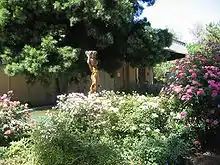
- 1944–1946 Sam W. Goossen – Acting President/Dean
- 1946–1947 George B. Huebert – Administrator
- 1947–1953 George W. Peters – President/Dean
- 1953–1954 Rueben M. Baerg – Acting President
- 1954–1955 Rueben M. Baerg – Acting President, one-half year; Administrative Committee last half of year, Dr. George W. Peters, Chmn.
- 1955–1960 B.J. Braun – President
- 1960–1961 Arthur J. Wiebe – Director of Pacific Bible Institute; Mr. Joel A. Wiebe – Interim Director
- 1961–1975 Arthur J. Wiebe – President
- 1975–1976 Edmund Janzen, Chairman, Presidential Council
- 1976–1982 Edmund Janzen – President
- 1982–1983 Silas Bartsch – Interim President; Edmund Janzen on leave
- 1983–1985 Edmund Janzen – President
- 1985–1997 Richard Kriegbaum – President
- 1997–2000 Allen Carden – President
- 2000–2002 Harold Haak – President
- 2002–2012 D. Merrill Ewert – President
- 2012–2014 Pete Menjares – President
- 2014–2017 Richard Kriegbaum — President
- 2017–2022 Joseph Jones — President
- 2022−present André Stephens – President
Academics
Fresno Pacific offers bachelor's degrees in more than 40 fields with over 100 areas of study. It also offers advanced degrees or credentials in four areas: Education, Individualized Master of Arts, MBA, Leadership & Organizational Studies and Peacemaking & Conflict Studies. The university is organized into five schools: The School of Business; the School of Education; the School of Humanities, Religion and Social Sciences; the School of Natural Sciences; and the School of Biblical Seminary. Fresno Pacific is accredited by the WASC Senior College and University Commission.
Graduation guarantee
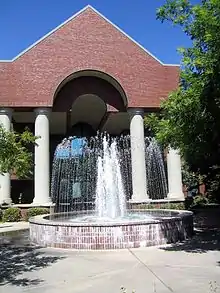
In February 2009 Fresno Pacific University began offering a "Four Year Graduation Guarantee."[5] FPU already has the highest four-year graduation rate in the Central Valley, with 60 percent of traditional undergraduate students already graduating in four years, compared to 12–15 percent in the CSU system.
The university will guarantee graduation within four years to qualified students entering the traditional undergraduate program. The guarantee is limited to basic graduation requirements for a single major with no minor. Transfer, degree completion and graduate students are not part of the guarantee.
Student responsibilities include:
- Sign up for the guarantee during the freshman year, choose a major by the second semester of the freshman year and keep that major until graduation.
- Make course plans with their adviser, follow those plans and meet all advising, registration and financial aid deadlines.
- Complete at least 32 units per year with passing grades in each course and remain in good standing behaviorally.
Campuses
Fresno Pacific University's main 50-acre campus is located in the south east area of Fresno, hub of the Central Valley region of California and the fifth largest city in the state.
The university also maintains four regional campuses in Central California:
- Merced Regional Campus
- North Fresno Regional Campus
- Visalia Regional Campus
- Bakersfield Regional Campus
Buildings
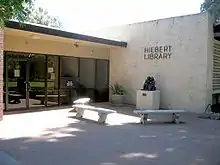
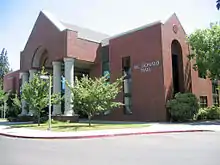
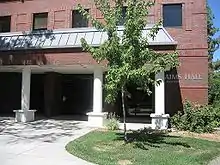
| Completed | Name | Information |
|---|---|---|
| 1958 | Sattler Hall | Named for early Anabaptist leader Michael Sattler in 1973. |
| 1961 | Krause Hall | Named for Arthur and Lydia Krause in 1990. Further units added to in 1962. |
| Nachtigall Hall | Named for Ben W. and Anna Marie Nachtigall in 1989. Further units added in 1962. | |
| Schlichting Hall | Named for Marvin and Loree Schlichting in 1994. Further units added in 1962. | |
| Warkentine Hall | Named for Al and Dotty Warkentine in 1989. Further units added in 1962. | |
| 1962 | Hiebert Library | Named for Cornelius and Elizabeth Hiebert, the primary contributors. |
| 1964 | Alumni Hall | Building costs were mostly covered by alumni (renovated 2005). |
| 1966 | Marpeck Center | Named for early Anabaptist leader Pilgram Marpeck in 1973. |
| 1968 | Kriegbaum Hall | Part of Witmarsum Quad, renamed for former college president Richard Kriegbaum. |
| Witmarsum Quad | Named for the village of Witmarsum, birthplace of Menno Simons, in 1973. | |
| 1971 | Strasbourg Hall | Named for the city of Strasbourg, where early Anabaptists often sought refuge, in 1973. |
| 1981 | Special Events Center | |
| 1986 | Bartsch Hall | Named for Silas Bartsch and his wife Nadine Bartsch.[1][6] Silas was an administrator and former interim president.[7] The building was an existing residence which was purchased and remodeled. |
| 1990 | Wiebe Education Center | Named for Arthur and Evelyn Wiebe. Arthur was a former president and member of the faculty, as well as the president of the AIMS Foundation, which provided a large portion of the funding. |
| 1992 | McDonald Hall | Named for Arthur and Barbara McDonald, contributors and co-chairs of the fundraising campaign. |
| 1998 | Jost Hall | Formerly known as East Hall, changed in 2017 to current name. |
| 2002 | AIMS Hall | Named for The AIMS Foundation, which provided a large portion of the funding by means of a grant. |
| 2003 | Steinert Campus Center | Named for Marvin and Nadine Steinert, primary contributors. |
| 2010 | Seminary House | Previously the administration building of Mennonite Brethren Biblical Seminary, which became a part of the university in 2010. |
| 2010 | North Hall | Previously a classroom, student center, and office building of Mennonite Brethren Biblical Seminary. |
| 2022 | Warkentine Culture and Arts Center | Building on Townsend Street dedicated to the arts program. Construction was funded through fundraising and private donations. |
Athletics
The Fresno Pacific athletic teams are called the Sunbirds. The university is a member of the Division II level of the National Collegiate Athletic Association (NCAA), primarily competing in the Pacific West Conference (PacWest) for most of its sports since the 2012–13 academic year.[8] while its men's and women's water polo teams compete in the Western Water Polo Association (WWPA). The Sunbirds previously competed in the Golden State Athletic Conference (GSAC) of the National Association of Intercollegiate Athletics (NAIA) from 1986–87 to 2011–12.
Fresno Pacific competes in 17 intercollegiate varsity sports: Men's sports include baseball, basketball, cross country, soccer, swimming, tennis, track & field and water polo; while women's sports include basketball, cheerleading, cross country, soccer, swimming, tennis, track & field, volleyball and water polo.
Mascot
The athletics mascot is Sunny the Sunbird. Sunny is a much loved figure in the campus community.
Traditions
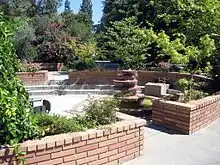
- The Wittenberg Door, a board located in the atrium of Steinert Campus Center, near the entrance to the dining room, is a place for the exchange of ideas. People are free to post expressions of their views, but are asked to write pieces in a charitable spirit and to include the writer's name. It was built in approximately 1983 and the original version was located in Alumni Hall when it still served as the campus cafeteria. A new board was built in 2004 and the old one was dismantled. The Mennonite Brethren Biblical Seminary has a board with the same name and purpose outside the B.C. Lounge.
- The Mennonite Central Committee holds its annual West Coast Relief Sale and Auction on the campus during the first weekend in April, at approximately 4:00 p.m. – 9:00 p.m. Friday and 7:00 a.m. – 3:00 p.m. Saturday. Ethnic foods, used books, antiques, plants, world crafts and quilts are all sold on campus in various booths and auction events.
- University Family Thanksgiving Meal
- Winter Formal
Notable alumni
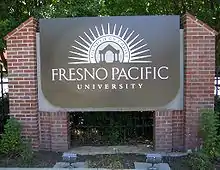
- Ron Adams, 3-time NBA champion assistant coach for the Golden State Warriors
- Pablo Campos, professional soccer player and MLS champion with Real Salt Lake
- Malcolm Griffin, professional basketball player
- Dan Quisenberry, former Major League Baseball all-star pitcher for the Kansas City Royals
- Chris Schwinden, former Major League Baseball pitcher for the New York Mets
- Joshua Urbiztondo professional basketball player (PBA)
- Joey Wells, head women's basketball coach at Indiana State University
References
- Enns-Rempel, Kevin; Keeney, Hannah (2020). "Fresno Pacific University: The first 75 years". Arcadia Publishing. pp. 90, 84. ISBN 9781467104593. Retrieved 2021-01-22.
- Peters, George W and Richard D. Thiessen (July 2008). "Fresno Pacific University (Fresno, California, USA)". Global Anabaptist Mennonite Encyclopedia Online. Retrieved 2009-11-28.
- "Worst List: The Absolute Worst Campuses for LGBTQ Youth". Campus Pride. Retrieved August 23, 2021.
- George, Carmen (September 12, 2015). "Fresno Pacific president's statement about gay marriage causes strong reactions". Fresno Bee. Retrieved August 23, 2021.
- "Four Year Guarantee". Archived from the original on 2012-07-12. Retrieved 2009-02-14.
-
Wiebe, Arthur J. (2010). "Education and entrepreneurship: a personal journey" (PDF). 39 (1). Direction: 93. Retrieved 2021-01-22.
Silas Bartsch resigned as Superintendent of Kings River Unified School District to launch our professional development program. While its mission was to improve education in Valley schools, it also generated income that helped fund undergraduate education.
{{cite journal}}: Cite journal requires|journal=(help) -
Steffen, Wayne (2001-10-25). "Silas Bartsch lived his passion for service, innovation and education". University News (FPU). Retrieved 2021-01-22.
Wiebe remembered the telephone call where Bartsch offered, not just to serve on a board or advisory committee as Wiebe had thought, but to leave his post as superintendent of Kings Canyon Unified School District to teach at FPU.
- Staff (June 1, 2011). "Sunbirds accept PacWest invite". The Fresno Bee. Archived from the original on June 6, 2011. Retrieved June 2, 2011.
Further reading
- Toews, Paul, ed. Mennonite Idealism and Higher Education: The Story of the Fresno Pacific College Idea. Fresno, Calif.: The Center for Mennonite Brethren Studies, 1995. ISBN 1-877941-05-0.
- Wiebe, Joel. Remembering...Reaching: A Vision of Service, a Fifty Year History of Fresno Pacific College. Fresno, Calif.: Fresno Pacific College, 1994. ISBN 1-884397-01-8.